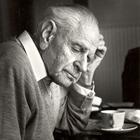
Vienna, July 28, 1902 London, September 17, 1994 Science, Human and Social Sciences, Philosophy Sir Karl Raimund Popper was a philosopher, sociologist and theoretician of science born in Austria and later a British citizen. He studied philosophy at the University of Vienna and later taught at Canterbury in New Zealand (1937-1945) and the London School of Economics in London (1949-1969). Although it is positioned close to the neopositivist philosophy of the Vienna Circle, it carried out an important criticism of some of its postulates. he accused of excessively dogmatic the position of dividing knowledge between scientific propositions, which would be the only ones properly significant, and metaphysical, that would not be significant. For Popper, it would suffice to strictly delimit the terrain of science, without denying the effectiveness of other discourses in areas other than science. Popper is also the architect of the epistemological current of falsificationism. For Popper, to find a theory means to try to refute it by means of a counterexample. If it is not possible to refute it, this theory is corroborated, being able to be accepted provisionally, but never verified. In The Open Society and its Enemies, published by Ediciones Paidós, Popper defended democracy and showed objections to the authoritarian implications of the political theories of Plato and Karl Marx. He criticized the idea that the discovering laws of the development of history make its future course inevitable and, therefore, predictable.




